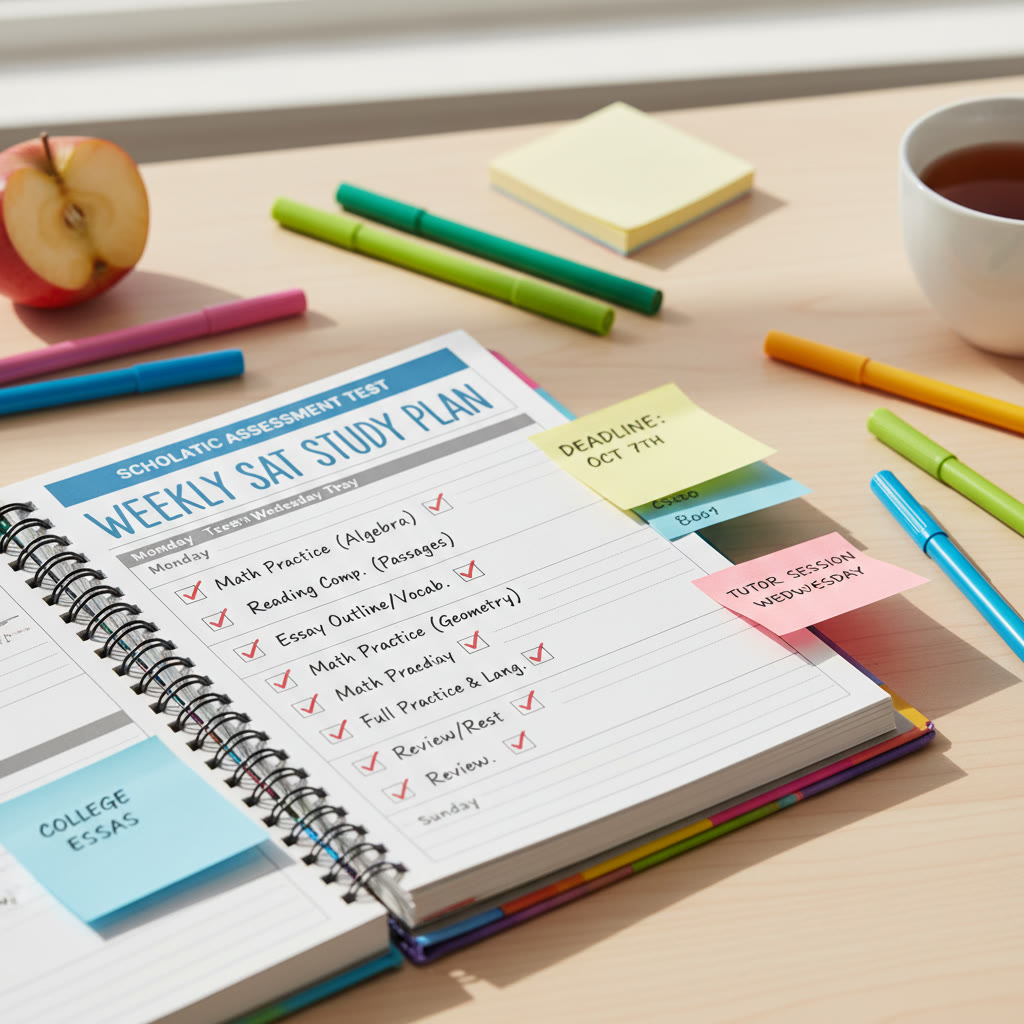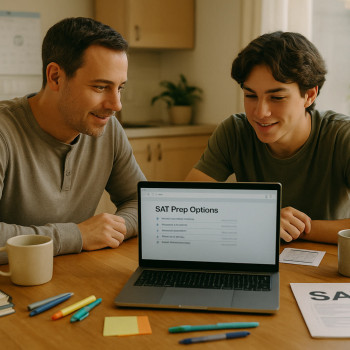Why an accountability partner can make or break your SAT prep
Preparing for the SAT can feel like running an invisible race: you know where the finish line is, but it is all too easy to stall on the long stretches. An accountability partner turns that lone run into a relay. They are the person who notices when you slow down, celebrates when you sprint, and helps put structure around your daily practice so progress becomes visible and achievable.
This isn’t just motivational fluff. Studies of goal achievement show people who publicly commit to a target, and check in regularly, are far more likely to hit it. For students, an accountability partner brings social pressure in the best possible way: supportive, consistent, and focused on improvement. Add a clear plan, weekly check-ins, and simple tracking, and the mountain of SAT prep turns into a series of manageable hills.

What exactly is an SAT accountability partner system?
Definition in plain language
An SAT accountability partner system is a structured setup where one or more people agree to support each other through the SAT-prep timeline. It combines small-scale coaching, mutual check-ins, shared resources, and measurable goals. Crucially, it is consistent: the system sets the rhythm for study sessions, practice tests, and progress reviews.
Different forms it can take
- One-on-one peer partnership: two students pair up and meet regularly.
- Triad or small group: three to four students rotate responsibility and provide varied feedback.
- Partner + mentor hybrid: a student pairs with a peer and checks in periodically with a coach or tutor for expert guidance.
How to choose the right partner
Look for similar commitment, not identical ability
Matching ability levels seems logical, but compatibility of commitment often matters more. A slightly stronger or slightly weaker partner is fine—as long as both people are reliable, honest, and willing to stick to the agreement. One common mistake is pairing with a friend who is great company but inconsistent in study habits.
Compatibility checklist
- Shared goal clarity: both know target score ranges and test dates.
- Similar weekly availability and time zones.
- Compatible communication styles: direct feedback versus gentle encouragement.
- Mutual reliability: show up to scheduled sessions and do assigned work.
- Willingness to use the same tracking tools.
Where to find partners
Look in your school, SAT clubs, online study groups, or local tutoring centers. If you need a reliable hybrid setup, consider pairing with a student while also using Sparkl’s personalized tutoring for occasional 1-on-1 guidance. A tutor can help set the initial roadmap and offer expert check-ins while a peer keeps daily accountability strong.
Designing your accountability system: the building blocks
1. Start with clear, shared goals
Begin by answering: what is our target score, and why? Short-term goals help convert the big number into weekly wins. Examples:
- Increase composite score by 80 points in 8 weeks.
- Cut time-per-question by 15 seconds in the Reading section in 4 weeks.
- Consistently finish full practice tests under timed conditions by week 6.
2. Create a predictable weekly routine
Predictability avoids negotiation fatigue. Decide on daily micro-tasks and weekly macro-tasks so both partners know what to expect.
| Day | Task | Time Commitment | Purpose |
|---|---|---|---|
| Monday | 20-min timed vocabulary/reading drill | 20 min | Fluency and speed |
| Wednesday | 45-min math problem set + review | 60 min | Concept mastery |
| Friday | Partner check-in: goals + problem discussion | 30 min | Accountability and feedback |
| Saturday | Full practice section or timed official set | 60–90 min | Simulated practice |
| Sunday | Reflection + plan next week | 15–30 min | Adjustments and mental reset |
3. Define roles and expectations
Even in a two-person partnership, it helps to name responsibilities. This reduces ambiguity.
- Organizer: schedules meetings and shares agenda.
- Resource curator: finds practice sets and keeps a folder with materials.
- Timekeeper: starts timers during practice and ensures sessions stay productive.
- Accountability officer: follows up on missed tasks and suggests adjustments.
Check-ins and meeting templates that actually work
Daily quick check (5–10 minutes)
This is the glue. A quick text, voice note, or a 5-minute call where you say: what I did today, one obstacle, tomorrow’s plan. Keep it short, factual, and consistent.
Weekly deep-dive meeting template (30–45 minutes)
Use an agenda to keep these reviews efficient. Below is a simple template to follow:
- 5 minutes: Wins from the week (specific examples)
- 10 minutes: Review timed practice and problem areas
- 10 minutes: Plan and assign tasks for the coming week
- 5 minutes: Emotional check-in and adjust expectations
- Optional: 10 minutes of targeted practice together
Tracking progress: what to measure and how
Key metrics that matter
Not every number is useful. Focus on metrics that predict SAT performance and your study habits.
- Official practice test score by section
- Weekly practice volume (hours or number of practice sections)
- Accuracy on targeted question types (e.g., algebra, data interpretation, evidence questions)
- Average time per question in each section
- Consistency score: percentage of scheduled tasks completed
| Metric | Baseline | Weekly target | Notes |
|---|---|---|---|
| Reading score | 24 | +3 per 2 weeks | Focus: evidence questions |
| Math score | 26 | +4 in 6 weeks | Work on algebra timing |
| Weekly practice hours | 4 hours | 6 hours | Short daily drills + weekend full sections |
| Consistency | 60% | 85%+ | Daily check-ins to improve |
Tools and tech to simplify tracking
Choose tools that remove friction. A shared spreadsheet, a habit-tracking app, or a simple checklist in a notes app can work. If you want more advanced analytics, a tutoring program that offers AI-driven insights can identify weaknesses faster than manual tracking. Sparkl’s personalized tutoring combines expert tutors with AI-driven insights and tailored study plans, which fits nicely into an accountability system where the partner handles daily rhythm and the tutor provides deep-dive instruction.
Keeping motivation high and handling setbacks
Design rituals that produce momentum
- Start every session with a tiny, guaranteed win—one question you can do confidently.
- Celebrate small milestones publicly to reinforce positive behavior.
- Create a failure plan: define what a slip looks like and the precise reset steps.
When things go wrong: the reset plan
If you miss two sessions in a row or your scores plateau, use this three-step reset:
- Pause and diagnose: Which area caused the dip? Timing, strategy, knowledge gap, burnout?
- Adjust load, not ambition: reduce hours for a week but keep quality high; swap extra volumes for targeted tutoring if needed.
- Recommit with external accountability: schedule a check-in with a parent, counselor, or a Sparkl tutor for a professional nudge.
Sample 8-week accountability plan you can copy
Below is a practical week-by-week plan designed for two partners who are balancing school with SAT prep. It assumes 8 weeks until a practice test that matters or a real test date. Tailor specific content to your baseline and target.
| Week | Focus | Partner activities | Metrics |
|---|---|---|---|
| 1 | Baseline + planning | Take a full practice test; set goals; pick tools | Baseline scores, weekly schedule |
| 2 | Target weaknesses | Daily 20-min drills; partner review Friday | Accuracy by question type |
| 3 | Timing and pacing | Speed drills; timed sections together | Avg time per question |
| 4 | Mixed practice | Alternate sections; weekly full timed section | Section scores |
| 5 | Targeted review | Deep-dive on toughest topics; consider tutor session | Improvement on targeted topics |
| 6 | Full test simulation | Take full timed practice test; detailed partner debrief | Practice test score |
| 7 | Polish and strategy | Strategy sessions: guessing, timing, stress management | Consistency and calm under timed conditions |
| 8 | Final adjustments | Light practice, sleep routines, final plan | Readiness score, confidence |

Real-world tips from students who made it work
One student I coached with a partner used a simple rule: if either missed a scheduled session, the other bought a small treat at the next meet. That tangible, low-stakes consequence improved reliability more than guilt ever could. Another pair used a shared playlist and worked with 25-minute focused blocks; the music became a Pavlovian signal for concentrated work.
These small rituals are powerful because they convert abstract responsibility into a set of visible habits. Paired with objective tracking, that combination produces both momentum and measurable improvement.
When your accountability partner system needs professional help
There are times when peer accountability is brilliant and times when you need a professional to break a plateau. Consider bringing in a tutor if:
- Your section scores plateau despite consistent practice.
- You have persistent conceptual gaps that peer explanation doesn’t resolve.
- You want a tailored study plan that adapts as you progress.
That is where Sparkl’s personalized tutoring fits naturally. A tutor can provide expert diagnostics, 1-on-1 guidance, tailored study plans, and AI-driven insights that highlight the exact types of questions costing you points. Combine that with your partner’s daily support and you have a powerful, layered accountability system.
Final checklist: set your system up tonight
- Pick your partner and agree on a shared goal and test date.
- Create a simple shared tracker (spreadsheet or app) with baseline scores.
- Schedule daily quick checks and one weekly deep-dive with an agenda.
- Assign roles and a small consequence or reward system for missed commitments.
- Plan an 8-week cadence with full practice tests at weeks 1, 6, and 8.
- If you need specialized instruction, schedule a session with a tutor for targeted gaps; Sparkl’s personalized tutoring can provide 1-on-1 guidance and tailored plans to accelerate progress.
Parting thought: predictability beats bursts of effort
The single biggest advantage of an accountability partner system is predictability. When SAT prep becomes a predictable habit rather than an occasional cram, learning compounds. Small daily improvements — tracked, reviewed, and celebrated with someone who cares — will take you further than last-minute intensity. Build the system that fits your life, iterate quickly when something fails, and don’t be shy about bringing in an expert when the plateau arrives. With a good partner, a clear plan, and the right support, the score you want becomes a matter of when, not if.
Now grab your partner, set the first check-in, and start with a single, tiny win: schedule your first 20-minute practice drill tonight. You’ll be surprised how quickly momentum follows.

















No Comments
Leave a comment Cancel